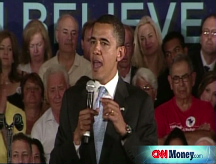Why pulling out of Iraq won't save money
Both McCain and Obama say a drawdown in Iraq can provide a fiscal boost to help with their economic goals. But it's not as simple or as lucrative as they make it sound.
NEW YORK (CNNMoney.com) -- End the war, save money that can be used for other purposes. That's effectively how both John McCain and Barack Obama frame the fiscal outcome of drawing down troops in Iraq.
It sounds right, but federal budget experts say that to arrive at that conclusion requires a bit of fairy-tale math.
"They kind of create money out of thin air," said Maya MacGuineas, president of the Committee for a Responsible Federal Budget.
Here's what she means: Washington is charging the cost of the wars in Iraq and Afghanistan to its national credit card. So far, the government has spent between $700 billion and $800 billion since 2001. Simply deciding to spend less money the government doesn't have will not free up real money to pay down the current deficit or help pay for new endeavors.
"We'll be borrowing less, but we'll still be borrowing," MacGuineas said.
And for awhile, the country may even end up borrowing more because of the additional costs of bringing troops and equipment home while continuing to prosecute the war at some level. So depending on the extent of the drawdown and the timing, the deficit may actually go up initially.
But that's not the initial impression that the average voter might get from the way the campaigns present the issue.
The McCain campaign says "the McCain administration would reserve all savings from victory in the Iraq and Afghanistan operations ... for reducing the deficit. Since all their costs were financed with deficit spending, all their savings must go to deficit reduction."
McCain economic adviser Douglas Holtz-Eakin told CNNMoney.com that the savings McCain refers to would come from cutting in half the number of U.S. troops based in Iraq to 75,000 by 2013.
That won't reduce the deficit the country has incurred already. It may, of course, curb the deficit that the government otherwise would incur if it continues the war for years.
But to realize the fiscal benefits of a drawdown may take years - indeed, until after the next president leaves office.
The Congressional Budget Office estimated this spring that reducing troops to 75,000 by 2013 could increase the deficit by a net of $214 billion over 10 years.
It's hard to nail down how that estimate would compare to the country's fiscal situation if the war efforts continue at full throttle. That's in part because it's not clear how much lawmakers will allocate for war spending every year.
Obama would face the same types of fiscal questions. He is counting on a troop drawdown to help pay for new proposals.
"Sen. Obama's proposals identify reduced expenditures and sources of additional revenue that together more than pay for his middle-class tax cuts, health care plan, and other initiatives," said Obama economic adviser Dan Tarullo.
In other words, the campaign is pledging not to increase the current deficit with the cost of its new proposals, such as a new health care system. Instead, those new costs would be paid for by cutting spending in some areas, such as the Iraq war, and raising revenue by doing things like raising taxes on high-income filers.
Generally speaking, McCain has said he opposes committing to a timetable for withdrawal. Obama says he thinks that's what Americans and Iraqis want, although he would balance that desire with "all the factors that go into American security." He also has said, "We've got to get more troops in Afghanistan."
All that means is there's no way to gauge yet how much either candidate would reduce war spending over the long-run, and how much so-called "savings" they would realize. But that's not stopping them from banking on the idea to help sell their other proposals to voters. ![]()





